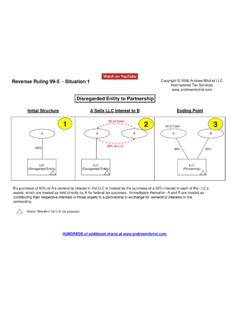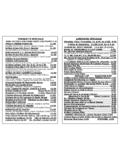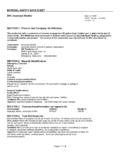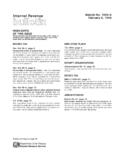Transcription of Operational principles for good pharmaceutical procurement
1 world health organization WHO/EDM/ Organisation mondiale de la Sant Original: English Distribution: General Operational principles for good pharmaceutical procurement Essential Drugs and Medicines Policy Interagency pharmaceutical Coordination Group Geneva, 1999 world health organization 1999 This document is not a formal publication of the world health organization (WHO), and all rights are reserved by the organization . The document may, however, be freely reviewed, abstracted, reproduced and translated, in part or in whole, but not for sale nor for use in conjunction with commercial purposes. The views expressed in documents by named authors are solely the responsibility of those authors.
2 Iii Authors and editors The contents of this document were adapted from: Chapter 13: Managing procurement . Management Sciences for health (MSH) in collaboration with the world health organization , Action Programme on Essential Drugs. Managing drug supply, second edition. Edited by Quick, J. Rankin, R. Laing, R. O Connor, Hogerzeil, Dukes and A. Garnett. Hartford, CT: Kumarian Press; 1997. The first draft text was prepared by J. Rankin1 in collaboration with Quick2 and S. After internal and external review the final text was edited by K. Woldeyesus,2 Fresle,2 G. Grayston2 and Acknowledgements The following persons have contributed to the development and review of this document and their advice and support are gratefully acknowledged.
3 Besten (IDA, Amsterdam), (Zimbabwe), (UNIDO, Vienna), (WHO/BCT), (UK), ( world Bank), ( world Bank), Haperen (Uganda Essential Drugs Support Programme), Hofsten (Angola Essential Drugs Programme), ( world Bank), (UNICEF), Joncheere (WHO/EURO), Kin Shein (WHO/SEARO), (Cyprus), (WHO/CDS), (WHO/EDM), (Boston), (Pharmachemie BV), ( world Bank), (WHO/VAB), (WHO/WPRO), (ICRC Geneva), ( world Bank), (UNICEF), (MSF, France), (UNICEF), (Copenhagen), Sabai (Egypt), (ICRC), (UNFPA), (Commonwealth pharmaceutical Association), (WHO/CHS), the late (WHO/DAP), Sterling ( world Bank), (WHO/SUP), ( world Bank), (PHARMECOR, Eritrea), ( world Bank). Since July 1998 incorporated in the Department of Essential Drugs and Medicines Policy (EDM).
4 1 Management Sciences for health , Washington, DC. 2 Department of Essential Drugs and Medicines Policy, world health organization , Geneva. iv Acronyms and abbreviations BCT Blood Safety and Clinical Technology CDS Communicable Diseases CHS health Systems and Community health DAP Action Programme on Essential Drugs ECHO Equipment for Charity Hospitals Overseas EDL Essential drugs list EDM Department of Essential Drugs and Medicines Policy EURO Regional Office for Europe FIP F d ration Internationale Pharmaceutique ICRC International Committee of the Red Cross IDA International Dispensary Association INN International Nonproprietary Name IPC Interagency pharmaceutical Coordination Group MIS Management Information System MSF M decins Sans Fronti res MSH Management Sciences for health SEARO Regional Office for South-East Asia SUP Supply Services UNFPA United Nations Population Fund
5 UNICEF United Nations Children s Fund UNIDO United Nations Industrial Development organization USAID United States Agency for International Development VAB Vaccines and Biologicals WHO world health organization WPRO Regional Office for the Western Pacific Contents vContents 1. Problem 2. Strategic objectives for good pharmaceutical 1. Procure the most cost-effective drugs in the right 2. Select reliable suppliers of high-quality 3. Ensure timely 4. Achieve the lowest possible total 3. Operational principles for good pharmaceutical Efficient and Transparent Drug Selection and Financing and Supplier Selection and Quality 4. Practical implementation Bibliography and further Operational principles for good pharmaceutical procurement vi Introduction 1 Introduction This document introduces four strategic objectives and twelve Operational principles for good pharmaceutical procurement .
6 These objectives and principles have been developed and endorsed by the Interagency pharmaceutical Coordination Group (IPC), involving the pharmaceutical advisers of the United Nations Children s Fund (UNICEF), the United Nations Population Fund (UNFPA), the world health organization (WHO) and the world Bank. The aim of this document is to improve pharmaceutical procurement practices in countries served by the IPC members. These Operational principles for good pharmaceutical procurement are not meant to regulate activities of international agencies, sovereign governments or private companies. They are presented strictly as a set of principles which can be reviewed and adapted by individual governments and public or private organizations in the process of developing their own internal procurement procedures.
7 These objectives and principles are published by WHO s Department of Essential Drugs and Medicines Policy (EDM) on behalf of the IPC, after an extensive review by experts from international agencies, governments, the pharmaceutical industry, essential drugs supply agencies and universities. pharmaceutical procurement occurs in many contexts. Although the Operational principles presented here are in many respects applicable to all procurement settings and for most types of procurement situations, their primary target is pharmaceutical procurement for public sector health systems. It is recognized that public sector procurement may be managed in a variety of ways, ranging from total in-house systems, through various autonomous or semi-autonomous procurement agencies, to total privatization.
8 These principles are applicable to each of those variations. The document is composed of four chapters. Chapter 1 consists of a brief problem statement which illustrates the need for improvements in procurement practices. Chapter 2 presents the four strategic objectives of pharmaceutical procurement which apply to any health system, whether it is public or private. Chapter 3 presents twelve Operational principles for good pharmaceutical procurement , grouped into four categories (management; selection and quantification; financing and competition; supplier selection and quality assurance). Chapter 4 gives more information on the practical implementation of the twelve principles and some useful information on mechanisms to further improve the performance of the procurement system.
9 A section of references and further reading is also included. Coordination and collaboration among technical development agencies continues to be a major issue. It is the hope of the IPC that these Operational principles will foster cooperation and standard approaches among national governments and Operational principles for good pharmaceutical procurement 2 donors actively attempting to improve public health and drug management around the world . Comments on this document are actively solicited and can be submitted to: The Director, Department of Essential Drugs and Medicines Policy, world health organization , CH-1211 Geneva 27, Switzerland; fax: +41 22 791 4167; e-mail: Problem statement 31. Problem statement pharmaceutical procurement is a complex process which involves many steps, agencies, ministries and manufacturers.
10 Existing government policies, rules and regulations for procurement as well as institutional structures are frequently inadequate and sometimes hinder overall efficiency in responding to the modern pharmaceutical market. Market constraints differ from country to country. Public sector drug procurement must take place in the context of both the local pharmaceutical market and the international market. In many countries public health officials have limited experience in designing an optimal procurement system to fit their market context. An increasing number of countries have moved, or are moving, away from a pharmaceutical procurement and distribution system which is totally operated by the public sector, and are investigating various options for involving the private sector in order to enhance public health .
















